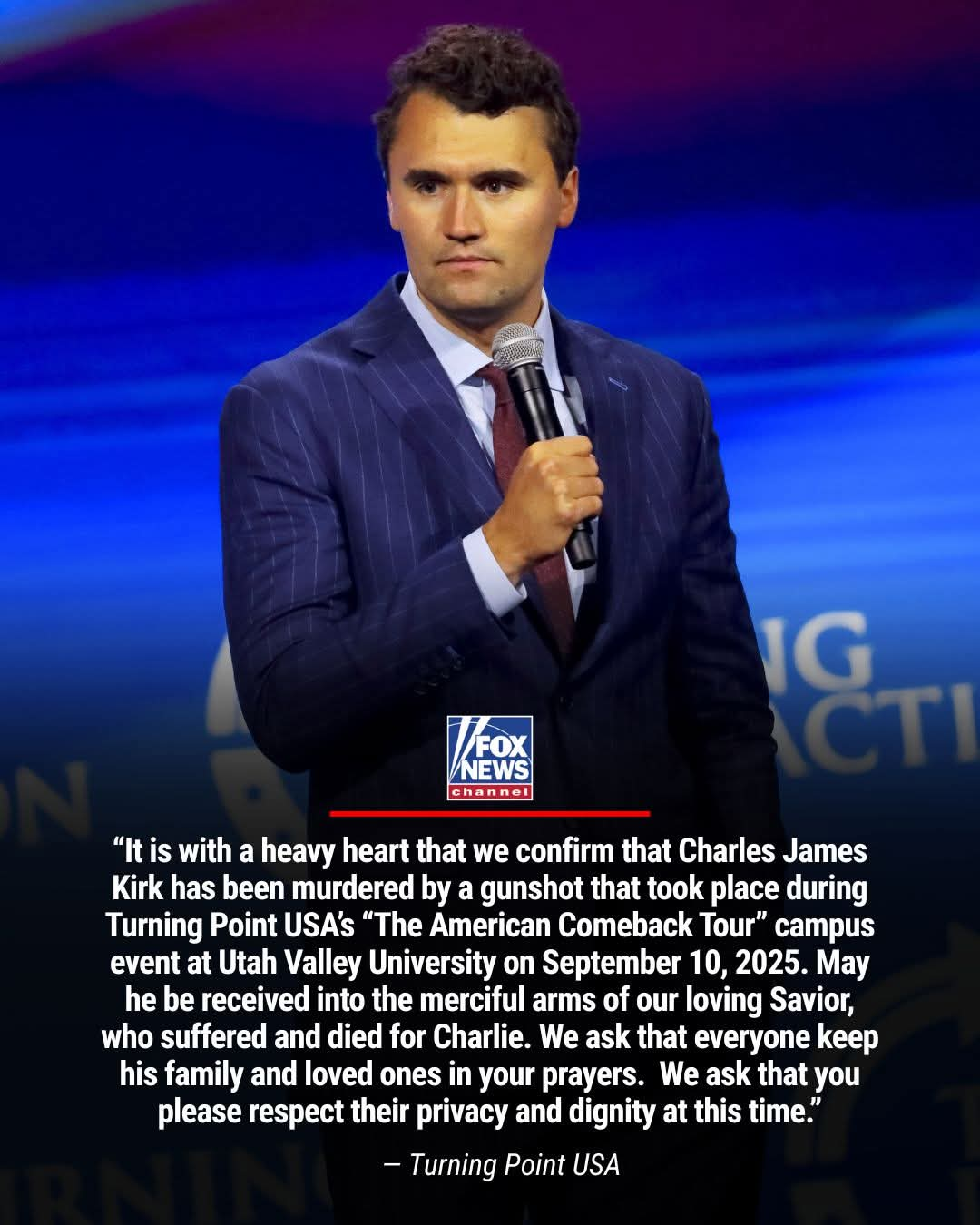NEWS
“May he be received into the merciful arms of our loving Savior, who suffered and died for Charlie.” ‘HEAVY HEART’: Turning Point USA released a statement after founder Charlie Kirk was shot and killed during a speaking event at Utah Valley University….. Full story below ⤵️

“May he be received into the merciful arms of our loving Savior, who suffered and died for Charlie,” issued after Charlie Kirk was shot and killed. I’ll cover the factual timeline, the statement itself, its theological / rhetorical implications, public reactions, and what this might mean going forward.
—
1. What happened: Key Facts
Charlie Kirk, founder of Turning Point USA, was fatally shot during a public event at Utah Valley University in Orem, Utah, on September 10, 2025.
The event was part of his organization’s “American Comeback Tour,” and included a “Prove Me Wrong” style debate table where Kirk engaged with students.
The shot reportedly struck him in the neck. He was taken to hospital but later died of his injuries.
The shooter (or shooters) remain at large, and investigations are ongoing. There was initial confusion with arrests, but no confirmed suspect at time of reporting.
—
2. The Statement & Its Context
Turning Point USA released a statement with deep sorrow, confirming Charlie Kirk’s death and urging for prayers for his family and loved ones. In that statement, they said:
> “May he be received into the merciful arms of our loving Savior, who suffered and died for Charlie.”
They also asked for privacy, respect, and dignity for his family at this time.
—
3. Theological and Rhetorical Aspects of the Statement
This sentence packs in both grief and faith, and uses Christian imagery. Here are some of the underlying components:
Christian compassion & hope: The idea of being received into “merciful arms” is one of grace, love, and care. It suggests that in death, there is comfort and divine welcome.
Reference to the suffering and death of Christ: “Who suffered and died for Charlie” points to a Christian doctrine that Jesus Christ suffers and dies to atone, or in some views to intercede on behalf of believers. It frames Charlie’s death as one in which Christ’s death is meaningful — notably that Christ’s suffering was not just general, but specifically “for Charlie,” which is a personalized expression.
Eternal reward: The wording implies that Charlie is now receiving or has received an eternal “reward” — being with Christ, beyond death. It reflects traditional Christian hope of the afterlife.
Comfort in tragedy: Such language is often used to offer consolation to the bereaved, to affirm belief that death is not the final word, especially within Christian communities.
—
4. Reactions and Broader Public Response
Political leaders condemned the violence. Some called this a “political assassination.”
President Donald Trump ordered flags to be flown at half-staff, described Kirk as beloved, used strong praise, and asked for prayers for his family.
Public tributes and outpourings of grief came from supporters and opponents alike, emphasizing shock, sorrow, and the need for national reflection on political polarization and violence.
—
5. Significance & Implications
The statement highlights how faith communities respond to tragedy: framing death in Christian terms can be powerful for those who share the beliefs, giving meaning and comfort.
It underscores the role of faith in public statements by organizations like Turning Point USA, which often lean heavily into Christian identity among supporters.
Also, it plays a symbolic role: by invoking suffering, mercy, the Savior, the statement affirms shared values among believers and suggests unity in grief beyond political or ideological divides.
On the political and social side, the incident amplifies concerns about political violence, security at public events, and how communities engage with dissent, disagreement, and free speech.
—
6. Possible Critiques or Counterpoints
Some may view invoking Christ “suffering and dying for Charlie” as overly personalizing theological doctrine, and others might debate the appropriateness of such religious framing in public or political discourse.
Those outside Christian faiths might not connect with the imagery — though many religious traditions have their own language of mourning and hope.
There may also be discussion on whether the use of religious rhetoric might sharpen polarizations (e.g. “us vs. them”) depending on how the statement is interpreted or used.
—
7. Questions Raised / Looking Ahead
Justice and investigation: Who was behind the shooting? What motive? Will this lead to more protections for public speakers and events?
Narrative and memory: How will Charlie Kirk’s life and death be remembered? Will the religious framing by his organization shape his legacy?
Public discourse: Will this event lead to changes in how political disagreement is held in the U.S.? How will leaders on both sides respond, especially around rhetoric?
Faith communities: How will churches and believers process and teach from this, especially those who supported Kirk, those who opposed him, and those touched by political violence more broadly?











